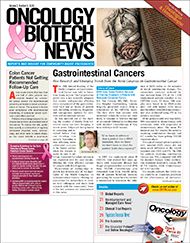Nutritional Supplements Can Help Increase Therapeutic Compliance
For patients undergoing chemotherapy, one of the greatest challenges they face is enduring what can be a grueling treatment regimen. Optimal nutrition can help patients better cope with the rigors of chemotherapy.
Click here to view as PDF.
For patients undergoing chemotherapy, one of the greatest challenges they face is enduring what can be a grueling treatment regimen. Optimal nutrition can help patients better cope with the rigors of chemotherapy. However, because of the nausea that often accompanies treatment, it is exceedingly difficult for patients to maintain proper nourishment. Thus, a vicious cycle ensues in which patients do not eat properly because of weakness and this weakness is exacerbated by the fact that they are not eating properly.
The incidence of malnutrition in patients with cancer ranges from 40% to 80%. Malnutrition is recognized as a poor prognostic indicator and can significantly affect treatment and recovery. Cancer and its treatment can affect a patient’s nutritional status in a number of ways. Some of the adverse effects associated with cancer treatment regimes include nausea, vomiting, diarrhea, mucositis (ulcers or sores in the mouth, stomach, and intestine), decreased ability to digest food, and alterations in smell and taste. According to nutritional experts, even a 5% loss in body weight can negatively affect a patient’s response to treatment. Nutritional supplements, which are formulated to meet bodily requirements in concentrated form and are therefore generally easier to tolerate than standard meals, can help alleviate problems associated with inadequate nutrition.
Gabriela Bonadonna, an oncology expert with Nestlé Healthcare Nutrition, explained, “From a cancer patient’s standpoint, fatigue is the number 1 side effect (of chemotherapy). (These patients are generally) not able to eat because they are nauseous. As a result, they are not getting a lot of energy or protein. Nutritional supplements enhance the normal nutrition that a person would be able to get. Nestlé, for example, has a product (Clinutren) that is designed specifically for patients who have undergone chemotherapy or radiation therapy. During times of stress, the body needs more protein and amino acids. Clinutren contains specific amino acids and other components that cancer patients require. Our product boosts both protein and calories and turns it into a full meal. In three ounces of fluid, one can get the equivalent nutrition of a chicken breast, vegetables, and rice without having to eat a plate of food.”
Information about nutritional supplements is available online. A simple Internet search yielded numerous brands and types of supplements. Ms. Bonadonna asserted that the Nestlé line of products (branded as Nutrient, Clinutren, Peptamen, and Modulen) have no direct competitors. Whereas other products provide protein and energy supplementation, Nestlé “medical foods” are unique because they are customized to meet the needs of chemotherapy patients, claimed Ms. Bonadonna. To direct patients who are interested in more information about Nestlé’s line of nutritional supplements, the company has created a Website that is specifically targeted to patients and their at-home caregivers. The Website can be accessed at www.nestlenutrition.com.
Proper nutritional intervention that includes nutritional supplementation as a tool to help chemotherapy patients, however, is not a brand-specific phenomenon. Regardless of the type of supplement selected, the bottom line for oncologists, according to Ms. Bonadonna, is that they should educate patients regarding supplements because “they will help patients stay on prescribed treatments,” enhancing outcomes and allowing for more aggressive therapeutic strategies. “The side effects of chemotherapy can make patients so weak that they can’t continue on,” stated Ms. Bonadonna. Nutritional supplements are a tool that can be employed to help patients maintain the strength they need to comply with necessary treatment.
